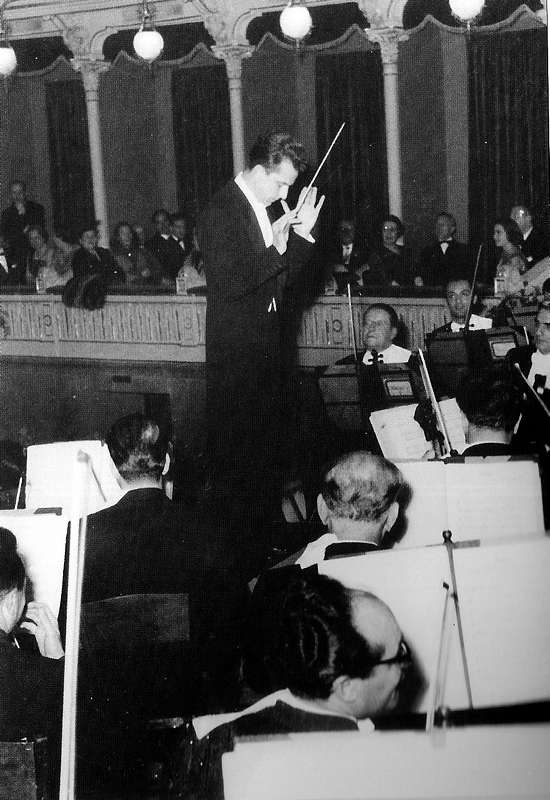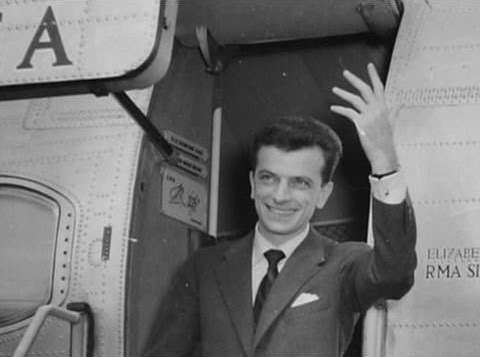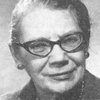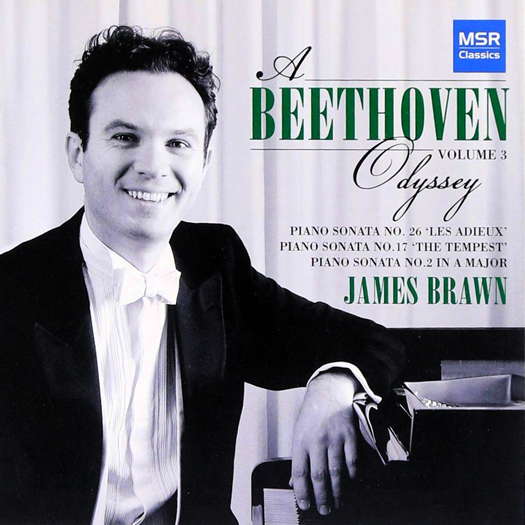Guido Cantelli
The Italian conductor's international
conducting competition comes back to life
After a forty-year absence, and to celebrate one hundred years since the birth of Guido Cantelli, the great conductor from Novara in North-West Italy, the conducting competition that was created in his memory comes to life again and takes on a strong international connotation while focusing on the younger generations. The competition has its natural home in the Teatro Coccia of Novara in Italy. Registrations for the competition will open from 1 March to 30 April 2020: conductors of all nationalities, between the age of 18 and 35, will be eligible to participate. Candidates will undergo a preselection based on their CVs and video recordings. From 9 to 12 September the finalists will fulfill the competition's assignments from the podium of the Orchestra del Teatro Regio in Turin and will be examined by a jury drawn from internationally renowned artists and cultural personalities. The second and last round of the finals will take place in Novara on 13 September 2020.
Guido Cantelli was born in Novara in 1920, and in his hometown, at the Teatro Coccia, he conducted his last concert on 17 November 1956 where he led the Orchestra of La Scala of which he had been nominated Principal Conductor the previous day.

Guido Cantell's last concert, on 17 November 1956
Only a few days later, on 23 November, the airplane that was taking him to New York crashed immediately after taking off from Orly airport in Paris. Cantelli was only thirty-six at the time, but had already become one of the most important conductors of the second part of the twentieth century, and had been acknowledged by Arturo Toscanini as his most authentic heir. To honor his name, in 1961 Novara's Provincial Tourist Board created the International 'Guido Cantelli' Competition for young conductors. Over the following ten editions, until 1980, the competition graduated some of the future greatest conductors: a roll of honor that besides Riccardo Muti, who won the competition in 1967, includes Eliahu Inbal (1963), Ádám Fischer and Lothar Zagrosek (1973), Hubert Soudant (1975) and Donato Renzetti (1980).
To celebrate one hundred years since Cantelli's birth, the competition comes alive again in a co-production with the Teatro Regio di Torino and a recording partnership with Warner Classics.
'I still keep a note that was handed by a classical music aficionado to the box office personnel of the Teatro Coccia to be delivered to me just a few days after I was nominated: "Director, please bring the Premio Cantelli back to life and bring it back to Novara"', says Corinne Baroni, Artistic Director of the Premio Cantelli and Director of Novara's Teatro Coccia. 'I can now happily state that after working on it for over a year, we are able to give back to the town a portion of its history. The Premio Cantelli maintains its prestige and its structure, but it comes back as the fruit of its time, a time that sees innovation as the engine for development. Not just a competition but an opportunity, a transmitter of values, and an instrument of dissemination.
The 2020 Cantelli has connected the entire town and its institutions in the creation of the Cantelli OFF, a truly parallel program of events coordinated by the Town of Novara. A red thread starting in April will lead us into September and to the Teatro Regio di Torino for the preliminary rounds, and then to the finals in Novara. Novara's middle school students will be sitting next to the jury to express their votes. Their judgment will not be focusing on technique and the artistic level, but it's going to highlight the human side and the communication skills of our young future conductors'.
'I am happy', adds Matteo Beltrami, Musical Director of the Teatro Coccia, 'that after a forty-year absence, and thanks to a long and determined effort by the whole theatre, talented musicians of our newer generation may again count on a serious and prestigious competition. A competition that has launched some of the most famous and important post-war conductors.'
'This year Novara is celebrating one hundred years since the birth of Guido Cantelli', explains the mayor, Alessandro Canelli. 'He was born in Novara and showed extraordinary skills from a very young age, leaving a lasting impact on the art of conducting. The city wants to remember him with a series of events that we are working on. The focus is the Teatro Coccia, where we are presenting the 'Guido Cantelli' conducting competition, forty years after its last edition. And a series of international-scale events that look at young orchestral conductors and artists who will find in Cantelli the right inspiration and the necessary tools to walk a difficult and demanding path, but one that is capable of bringing great satisfaction'.
Sebastian F Schwarz, Superintendent and Artistic Director of the Teatro Regio di Torino, says: 'I have always been intrigued by the figure of Cantelli, a talented man who was taken much too early from the stage and from life. That's why I'm particularly happy that the prize dedicated to him is coming back to life, thanks also to a collaboration between the Teatro Regio and the Teatro Coccia. It's the will of the Regio to open up to the whole region and offer to young talents the great experience that our prestigious orchestra has acquired by working with some of the greatest international conductors'.
Orchestral conductors Matteo Beltrami, Jordi Bernàcer, and Antonino Fogliani are the members of the jury who will pre-select the candidates. The names of the selected candidates will be made known on 17 June 2020. From 9 to 13 September the various steps of the competition will be taking place before an international jury, whose president will be Donato Renzetti, the last conductor to win the Premio Cantelli in 1980, and whose members are Gabriel Chmura (Premio Cantelli gold medalist, Artistic Director of the Poznan Opera, and First Guest Conductor of the Cracow Philharmonic), Nazzareno Carusi (pianist), José Luis Gómez (Musical Director of the Tucson Philharmonic Orchestra), Sebastian F Schwarz (Superintendent and Artistic Director of the Teatro Regio di Torino), Didier de Cottignies (Artistic Director of the Monte-Carlo Philharmonic Orchestra), Christoph Becher (Superintendent of the ORF – Vienna Radio Symphony Orchestra), and Sophie de Lint (Superintendent of the Amsterdam National Opera), apart from the already mentioned Matteo Beltrami, Jordi Bernàcer and Antonino Fogliani. Specifically, from 9 to 12 September 2020 are the preliminary rounds and semi-finals with the Orchestra of the Teatro Regio of Turin. On 13 September the finals will take place in Novara, where the candidates will perform the same program Cantelli conducted at his last concert: Johannes Brahms' Symphony No 1, Ravel's La Valse, and Richard Strauss' Don Juan.
The first prize amounts to 12,000 euros, in addition to contracts with important international orchestras. Apart from the first prize, the 2020 edition offers: a Critics Award (3,000 euros), granted by a jury, the members of which are Angelo Foletto (La Repubblica), Enrico Girardi (Il Corriere della Sera), Elvio Giudici (Il Giorno), Alberto Mattioli (La Stampa), and Carla Moreni (Il Sole 24 Ore); a Youth Award (1,000 euros), granted by a jury made of middle school students who will be attending the finals and voting for their favorite candidate. The same students will be involved in numerous open events (Cantelli OFF). Such events will focus on Guido Cantelli and are organized in collaboration with local institutes, associations and cultural and touristic institutions. The youth jury members will be made aware of the daily lives of the candidates, so that their votes may be also inspired by the candidates' communication, charisma and personality.
Ettore Borri, the Associazione Amici della Musica 'Vittorio Cocito' – who have been promoting the Cantelli Festival for over forty years – and the Conservatory 'Guido Cantelli' of Novara - the historical musical institution that has been partner of the Teatro Coccia on many occasions and productions - will be granting a special Town Award of 2,000 euros.
'If we don't tell new generations who Cantelli was', concludes Corinne Baroni, 'and if we don't help them know the candidates and the jury, if we don't lead them day by day on this adventure, then the Cantelli will be just another competition. The ambassadors and vehicles of all this will be the members of a new-born association, Giovani dietro le quinte (Youth behind the scenes): these young boys and girls will be promoting discussions and the exchange of opinions within their own group and with the Youth Jury. We are thinking of a channel where they are in charge of the contents, for example with interviews and insights, which they can develop using the tools they are most familiar with: social media and the digital era'.
Recordings of music conducted by Cantelli will fill the streets of Novara. To celebrate one hundred years since his birth, Warner Classics will be releasing Guido Cantelli: The Complete Warner Recordings, a ten-CD box with recordings of Guido Cantelli leading some of the greatest orchestras he worked with, like the Orchestra of the Teatro alla Scala, the Philharmonia Orchestra and the NBC Symphony Orchestra. To stand as a witness to his career for the years between 1949 and 1956, the box, out on 27 March, will include remastered recordings from original LPs to 192kHz/24-bit, most of them out of print, and a CD containing interviews with some of the musicians who worked under the great conductor.
Born in Novara on 27 April 1920, Guido Cantelli, the son of Antonio and Angela Riccardone, showed exceptional musical skills at a very early age. He was admitted to the Giuseppe Verdi Conservatory in Milan in 1939, where he studied composition under Arrigo Pedrollo and Giorgio Federico Ghedini, and orchestral conducting under Antonino Votto. Soon after his graduation, at the beginning of 1943, Cantelli made his debut at the Teatro Coccia in Novara, where he conducted La traviata. His career was interrupted when he was drafted during the war: after 8 September he was sent to a working camp near Stettino, not far from the shores of the Baltic. Once back in Italy he was hospitalized in Bozen in a state of serious malnutrition. He was able to escape and make an adventurous return to Novara, where he hid for a few months. He then went back to conducting in Biella, Novara and Vercelli. In 1945 he married Iris Bilucaglia and moved to Milan. His debut with the Orchestra of the Teatro alla Scala at the Sforza Castle on 27 July brought him to the attention of the entire musical world. From then on he worked in Turin with the Rai Orchestra, in Venice at La Fenice, in Bologna, in Genoa, in Cagliari, in Rome with the Orchestra di Santa Cecilia, and in Florence with the Orchestra of the Maggio.

Guido Cantelli (1920-1956)
On 21 May 1948 he conducted his first concert at La Scala: Arturo Toscanini recognized his talent and invited him to conduct the NBC Symphony Orchestra. In 1949 Cantelli made his triumphant debut in Studio 8H in New York, which followed another great success with the Philadelphia Orchestra. In 1950 he took La Scala on a tour in England. In 1951 he stood on the podium of the Philharmonia Orchestra in London – the Orchestra founded by EMI producer Walter Legge that hosted some of the greatest conductors, from Wilhelm Furtwängler to Herbert von Karajan – and with the Philharmonia he recorded all of his albums. His success continued uninterrupted, bringing him to his debut with the New York Philharmonic in 1952, and to work with all of the major orchestras in the US, and with the greatest soloists: Wilhelm Backhaus, Walter Gieseking, Jascha Heifetz, Nathan Milstein, Anton Rubinstein and Rudolf Serkin.
In 1956 he went back to conducting opera. The Così fan tutte he then conducted at the Piccola Scala remains legendary. The cast included Elisabeth Schwarzkopf, Graziella Sciutti, Luigi Alva, Rolando Panerai and Franco Calabrese. He also led the Orchestra of La Scala on a memorable tour to South Africa, and on 16 November he was nominated its Principal Conductor. The following day, 17 november, he held his last concert in Novara. One week later, during the night between 23 and 24 November 1956, the Orly disaster put a stop to the unique story of Guido Cantelli. During the funerals held in the church of Saint Mary of the Passion in Milan, the Orchestra of La Scala faced an empty podium and played the Largo movement from Handel's Serse.
Posted 29 February 2020 by Edoardo Pelligra

FURTHER INFORMATION: PREMIO CANTELLI 2020
FURTHER INFORMATION: GUIDO CANTELLI




